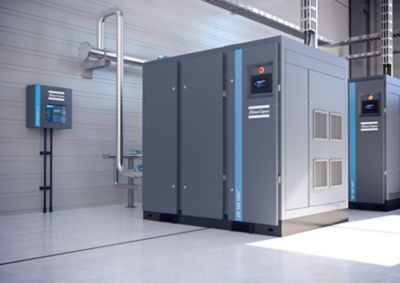Why use nitrogen for laser cutting?
Nitrogen is the most common assist gas used when the cut of the laser must be excellent. The process vaporizes the metal, and before the vaporized metal can resolidify, the nitrogen gas moves it away from the cut edge.
Nitrogen is also essential in:
- Reducing discoloration of the cut edge
- Establishing a barrier between atmospheric oxygen and the heated metal edge
- Assisting in heat dissipation, so the cut edge will cool faster
- Preventing oxidation to avoid problems with the finished product
- Helping to purge the laser beam
How nitrogen prevents oxidation during laser-cutting
Thanks to its inert properties, nitrogen allows the laser to operate in an oxygen-free environment without the risk of oxidation. When your application heats up and comes in contact with oxygen, a phenomenon known as oxidation occurs. This can cause a carbon layer to form on the cut edge resulting in issues such as poor product finish and adhesion problems for any coating or paint applied to the oxidised surface.
How nitrogen helps to purge the laser beam
To prevent the beam from distorting and to maintain power and intensity, the beam path needs to be kept clear of dirt particulates and any other contaminants that could cause it to diverge or lose power. Nitrogen is the ideal medium to use for beam guide-way purging as it is dry, clean, oil-free, and has a very low contaminant content.
What are the benefits of using nitrogen generators for your laser cutting application?
- Lower cost: Nitrogen assist and purge gas are some of the highest costs when it comes to laser cutting, particularly for fibre lasers . So any savings that will be made as a result of generating your own nitrogen will positively affect your bottom line.
- Higher productivity: By saving the time that is normally spent on changing tanks, you will ensure that your application runs continuously and without much attention from the operator.
- Better control: Generating your own nitrogen means no more ordering, changing and running out of bottles. No more liquid deliveries interrupting production, and you no longer have to deal with suppliers' unpredictable price increases.
- Highest efficiency: No oxide edge, high purity up to 99.999% gas available.
- On-demand nitrogen: This plug-and-play solution is sized to match your laser cutter, so you never need to empty your bottles and refill them during valuable production hours
- Plug and Play Solution: No need to buy separate compressors and equipment. Easily modified and upgraded if production increases.
What type of nitrogen generation packages are available to you ?
- A cylinder filling system that is designed to produce a small amount of gas on a continuous basis and then compress it to high pressure (300 – 350 bar g) for storage in a high pressure storage bank(s). This type of system is ideal for intermittent usage or where demand can fluctuate from high to low flow requirements frequently. Typically, a contract laser cutting job shop would benefit from this type of installation.
- A gas on demand system that is designed to meet the maximum flow requirement of the application with a small buffer stored at 40 bar .
Industrial gases and compressed air for laser cutting
In this eBook, you will find out all you need to know about the use of nitrogen and compressed air in laser cutting applications:
- The process of laser cutting
- The role of industrial gases and compressed air in laser cutting
- The importance of sustainability
- What the compressed air system for laser cutting looks like
- Why monitoring and maintenance matter
Do you have any specific questions for us or do you need more support? Our application experts are happy to help you. Get in contact by clicking the button below.


